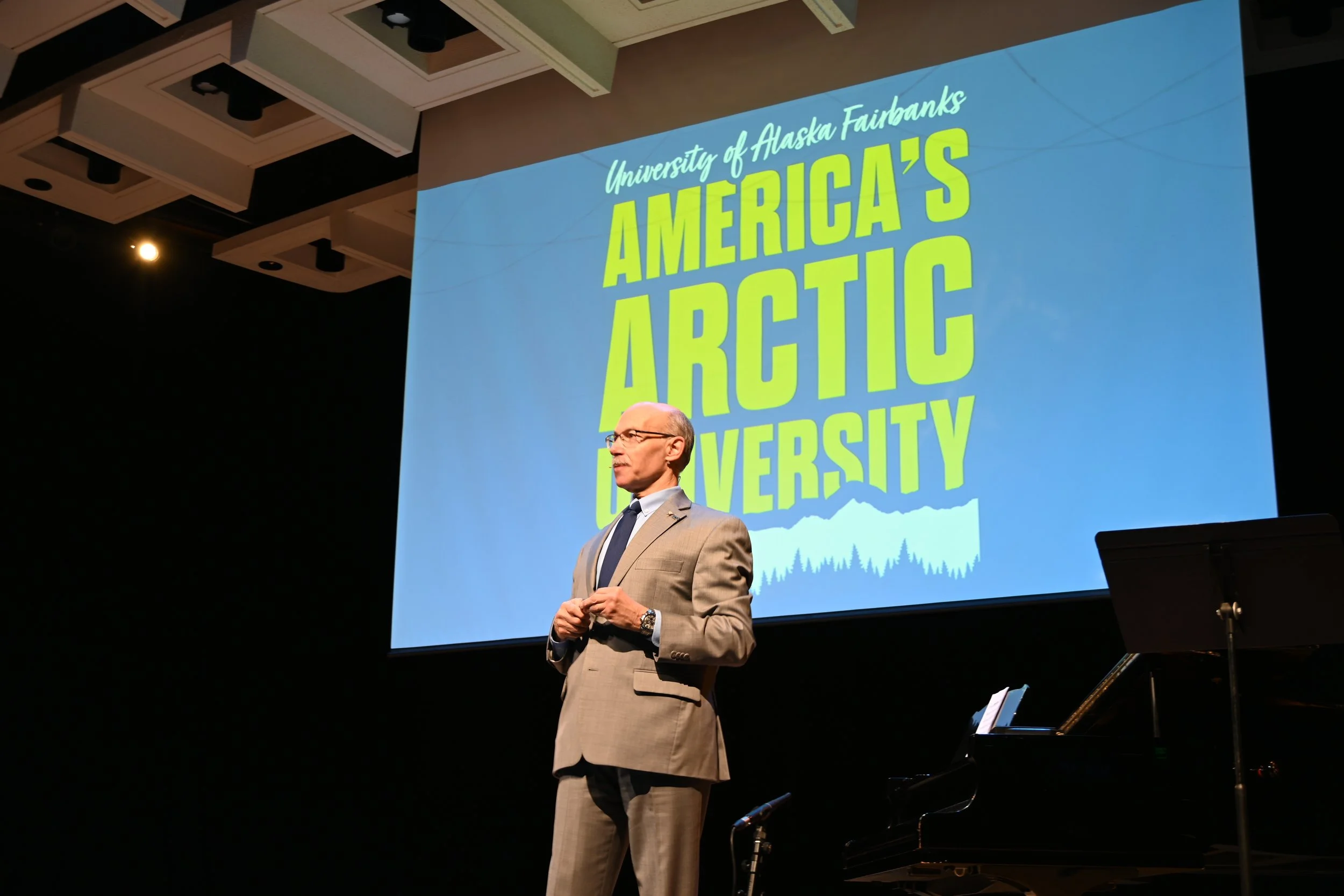Convocation 2025: Sfraga outlines vision for UAF’s future
By Amber McCain
University of Alaska Fairbanks Interim Chancellor Mike Sfraga delivered a message of progress and purpose Tuesday, Sept. 9 during the 2025 convocation, praising the university community for its resilience and outlining ambitious goals for UAF’s future.
Photo by Colin A. Warren
Interim Chancellor Mike Sfraga spoke on funding, enrollment, cuts, and progress during Convocation 2025, held in Davis Concert Hall in the Fine Arts Complex.
Speaking to hundreds in Davis Concert Hall and online, Sfraga encouraged faculty, staff and supporters to recognize recent achievements and embrace new opportunities. He was the first person to earn a Ph.D. in Northern studies and geography at UAF in 1997.
Sfraga’s optimism and humor shone as he shared stories about his time at UAF, enrollment challenges, and his plans for the future.
But behind the humor was a clear message: UAF is thriving.
Sfraga is serving as the interim chancellor of UAF for nine months following the retirement of former Chancellor Dan White. A nationwide search for a permanent chancellor is underway, with selection expected in spring 2026.
“This is not a job or a title, it’s a mission,” Sfraga said, commending the community for weathering “incredible storms” and continuing to move the university forward.
Since the fiscal year of 2019, UAF’s research revenue has increased by 54%, increasing from approximately $130 million to over $200 million annually. About 76% of that funding comes from federal sources according to the Alaska Office of Management and Budget, which Sfraga said is crucial to the university, as well as Alaska’s economy and the nation.
“Our researchers punch above their weight,” he said. “They’re competing with the best in the world, and they’re getting funded for work that matters.”
Enrollment is also on the rise, up 4.2% this fall, marking four consecutive years of growth to which Sfraga credited strong academic programs, dedicated staff, and deep community ties. He recalled a conversation with a parent who said their son turned down a full ride to Stanford to attend UAF.
“That’s music to our ears,” he said.
Scholarship and graduate programs are also expanding. According to Sfraga, enrollment in the UA Scholars Program, which provides scholarships of $15,000 (previously $12,000) to the top 10% of graduates from Alaska high schools, grew by 27% this year, with 179 new recipients. Ph.D. student enrollment rose by 44%, with more than 300 Ph.D. students now on campus, a major step toward UAF’s goal of achieving R1 research university status, the highest classification under the Carnegie system. However, their slow graduation rate here still poses a significant hurdle
Sfraga emphasized that UAF’s mission extends far beyond its Fairbanks campus. He pointed to new licensed practical nurse training in Nome, education programs in Kotzebue, and Native language preservation efforts, examples of UAF serving communities across the state.
“This is what it looks like when a university doesn’t just exist in a place, it serves that place,” he said. “These programs don’t just help communities grow; they help them hold on to their traditions.”
The university is also working with regional partners, including the Alaska Grant Program and the Bristol Bay Economic Development Corperation on education and workforce programs.
Despite the momentum, Sfraga acknowledged significant challenges ahead, especially around federal funding with uncertainty in Washington.
“We’re behind. It’s complicated,” he said. “But once we have clarity, we’ll be transparent, and we’ll need your input to move forward.”
Still, his message remained hopeful. He framed this moment as a turning point, a chance to act.
“All eyes are starting to look at Alaska, finally,” Sfraga said. “There are opportunities. We just have to seize them.”
In his closing remarks, he reminded the audience that UAF’s true strength isn’t found in budgets or buildings, it’s in the people who keep showing up.
“You’ve navigated deep cuts, a pandemic, uncertainty, and yet we’re still growing,” he said. “We are not retreating. We’re continuing to move forward.”


